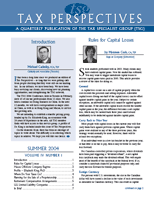
PDF Format
 Issue Contents Issue Contents
 All Issues All Issues
Summer 2004
Volume 4, Number 1
The information in Tax Perspectives is prepared for general interest only. Every effort has been made to ensure that the contents are accurate. However, professional advice should always be obtained before acting on the information herein.
In Brief
By Howard L. Wasserman, CA, CFP, TEP
Cadesky and Associates LLP (Toronto)
ID Numbers for U.S. Real Estate The IRS recently issued regulations stating that the foreign seller of U.S. real property must have a taxpayer identification number on all returns and documents for all closings occurring after November 3, 2003. The identification number is also needed to claim back tax withheld, normally being 10% of the gross proceeds. This requirement will have immediate impact on any foreign owner of U.S. real property. Obtaining a taxpayer identification number is not a quick and simple procedure. Therefore, if foreign residents wait until immediately before the closing day to apply for a taxpayer identification number, the closing date may have to be delayed. For those who anticipate selling their U.S. real estate within the foreseeable future, it is recommended that they apply for a taxpayer identification number now. In order to apply, Form W7, available on our website, must be completed and filed with the IRS. Section 160 Amendments — Accrued Interest Section 160 applies in situations where an individual has an unpaid tax liability and transfers assets to a related individual. This related individual is liable for any taxes that the first individual does not pay, up to the value of the property transferred. Now the new rule applies to both taxes and interest. Note that the interest on a tax assessment can grow and actually exceed the tax itself after seven or eight years. Refund of Instalments What happens if you pay tax instalments based on the prior year, and then suffer a major loss? Soon you will be able to get a refund of instalments paid, if it would cause undue hardship not to issue a refund. In order to receive a refund of instalments, you must meet the following conditions: - It is reasonable to conclude that the instalments exceed the taxes for the year (i.e., you have definitely overpaid).
- The Minister is satisfied that the instalments have caused or will cause undue hardship.
There is no clear guidance as to the meaning of undue hardship, but based on past experience, the criteria should not be too stringent. These rules are not yet in effect and will be applicable after the legislation receives Royal Assent. Pre-judgement Interest In general, pre-judgement interest (interest computed for the period prior to a court order or settlement) is taxable as interest income. However, it had been CRA's administrative policy not to tax pre-judgement interest on awards in respect of personal injury or death or awards for wrongful dismissal. The policy with regard to wrongful dismissal has been changed. Beginning in 2004, it is CRA's policy that pre-judgement interest on wrongful dismissal settlements will be taxable. The CRA policy will not change for pre-judgement interest on payments for personal injury or death. Foreign Tax Credits & Social Security In the past, CRA allowed a foreign tax credit for German and French social security taxes. However, effective for 2004 and subsequent years, only U.S. social security taxes will be available as a foreign tax credit. The U.S. social security taxes are treated differently because of the Canada-U.S. Treaty. GAAR and the Foreseeable Loophole The case of Imperial Oil Ltd. [2004 FCA 36] was heard by the Federal Court of Appeal, with judgment issued on January 26, 2004. In that case, a simple plan of loans and repayments defeated the much-disliked federal capital tax. The plan was blatant and had no business purpose. Its only purpose was to save capital tax. The Federal Court of Appeal refused to allow application of the General Anti-Avoidance Rule ("GAAR"). It held that the plan was not an abuse of the Income Tax Act. It was easy to foresee that such a plan would be used and the legislation was deficient since it did not address such a possibility. GAAR cannot be used to fix what the drafter of the law missed. Parliament must be given credit for enacting what it intended to enact. Thus, we now enter a new era in the GAAR saga: the Foreseeable Loophole defence. If you can demonstrate that a loophole was reasonably foreseeable, GAAR cannot be used as a backstop to deny you the benefits of the loophole.
| 



